
Many women experience problems in conceiving. While there are numerous causes of infertility, blocked fallopian tubes are one of the most common reasons. Tubal blockages were found in nearly 20% of women with primary infertility and nearly 30% of women experiencing secondary infertility (1).
Fallopian tube blockage can happen to one or both fallopian tubes. While block in a single fallopian tube may still allow you to get pregnant, blocks in both tubes may hamper fertility. Here is everything you need to know about blocked fallopian tubes.
In This Article
- What are Fallopian Tubes?
- What are Blocked Fallopian Tubes?
- Types of Fallopian Tube Blockages
- Causes of Blocked Fallopian Tubes
- How Are Blocked Fallopian Tubes Diagnosed?
- Can I Still Get Pregnant With a Fallopian Tube Blockage?
- Treatment For Fallopian Tube Blockage
- Complications and Risk Factors of Blocked Fallopian Tubes
- When to Consult the Doctor?
- FAQ’s
What are Fallopian Tubes?
Fallopian tubes are a pair of thin tubes that branch out (Fimbriae) to the pelvic cavity, one on either side of the uterus. Sometimes, women develop a block in one or both fallopian tubes known as the blocked fallopian tubes. At the utero-tubal junction, the Fallopian tubes open to the uterine cavity. This portion of the Fallopian tube is called the isthmus. With the help of Fimbriae, an egg that is released by the ovary gets into the Fallopian tube (2).
From here begins the journey of the egg to the uterus. There is a section towards the middle of the Fallopian tube known as the Ampullary where fertilization of an egg takes place. If the egg is fertilized, it will get implanted in the uterine wall and develop into a fetus. Thus, the egg produced in the ovary reaches the uterus through Fallopian tubes.
What are Blocked Fallopian Tubes?

As the name suggests, a woman will have blocked Fallopian tubes in case of an obstruction in the tubes. This can happen to one or both tubes. The blockage can also happen in any part of the tube. There are different kinds of blockages too. In some cases, certain infections and diseases can cause blocks in certain parts of the tube more than others.
Types of Fallopian Tube Blockages
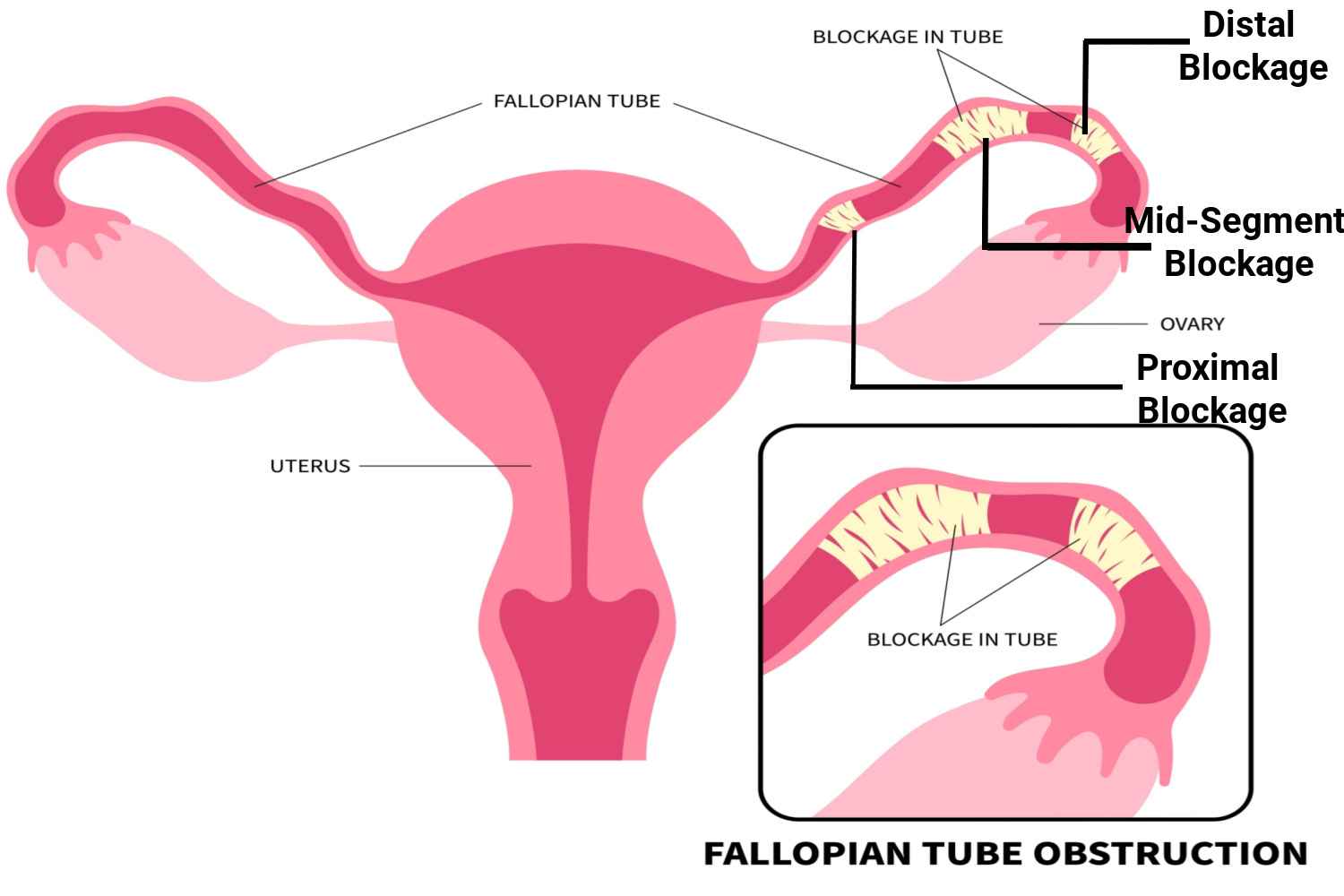
Based on the cause and location of the blockage, there are different types of blockages. Types of fallopian tube blockages include
1. Proximal Tubal Occlusion
This type of blockage occurs in the isthmus area. Proximal tubal occlusion usually happens because of an infection (3) which can be due to any complications from a previous miscarriage, abortion, or pelvic inflammatory disease (PID).
2. Mid-Segment Tubal Obstruction
As the name implies, this type of blockage happens towards the middle of the Fallopian tube, towards the ampullary area. It happens as this area is more prone to tubal ligation damage.
3. Distal Tubal Occlusion
This type of blockage affects the end of the Fallopian tube that opens into the ovary – the fimbriae area. Generally, distal tubal occlusion happens as an after-effect of Chlamydia trachomatis infection, a sexually transmitted disease (4).
4. Hydrosalpinx
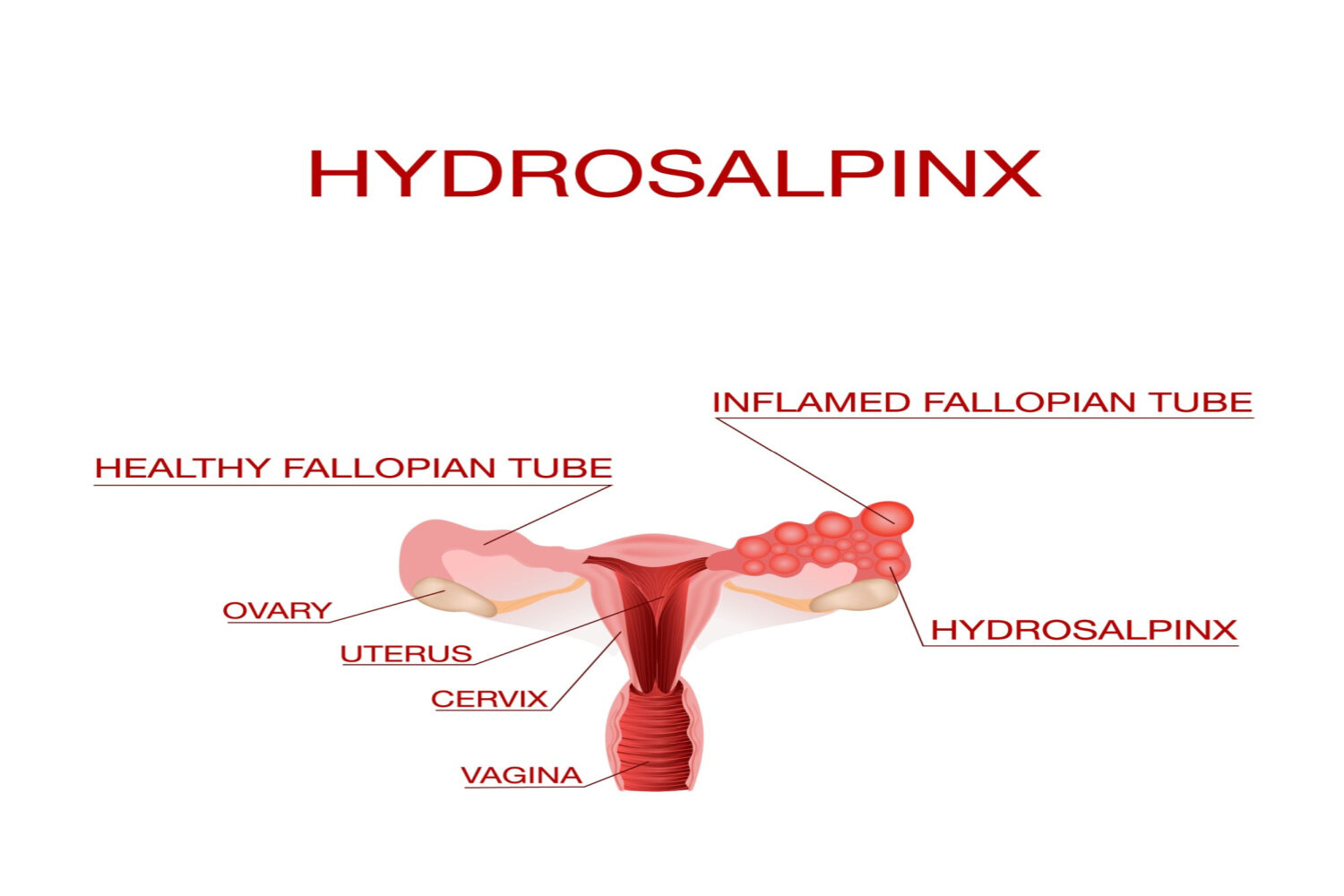
Hydrosalpinx is a blockage where some fluid fills the Fallopian tubes, giving them a sausage-like shape. As a result, the end of the fallopian tubes that open into the ovary see complete blockage.
5. Pyosalpinx
In this kind of blockage, fallopian tubes get completely filled, and sometimes, bloated with pus.
6. Hematosalpinx
This is a health condition that involves bleeding in the Fallopian tubes resulting in the accumulation of blood and clots inside the tubes causing a blockage.
7. Chronic Salpingitis
A bacterial infection and inflammation cause this in the Fallopian tubes. The infection, if not treated promptly, will develop into acute salpingitis, where the inner wall of the Fallopian tubes stick together and become red and swollen causing blockage and permanent damage to the tubes.
Causes of Blocked Fallopian Tubes
A blockage can happen in one or both Fallopian tubes. Some of the causes of the blockage (3A) are:
1. Endometriosis

Endometriosis can cause a blockage (5). This is because the scars and adhesion occuring as a result of the endometrial tissue can place physical pressure, and obstruct the fallopian tubes. This can prevent the tubes from taking in the eggs released from the ovary or making way for them to the uterus.
[Read : Can You Get Pregnant With Endometriosis?]
2. Pelvic Inflammatory Disease(PID)
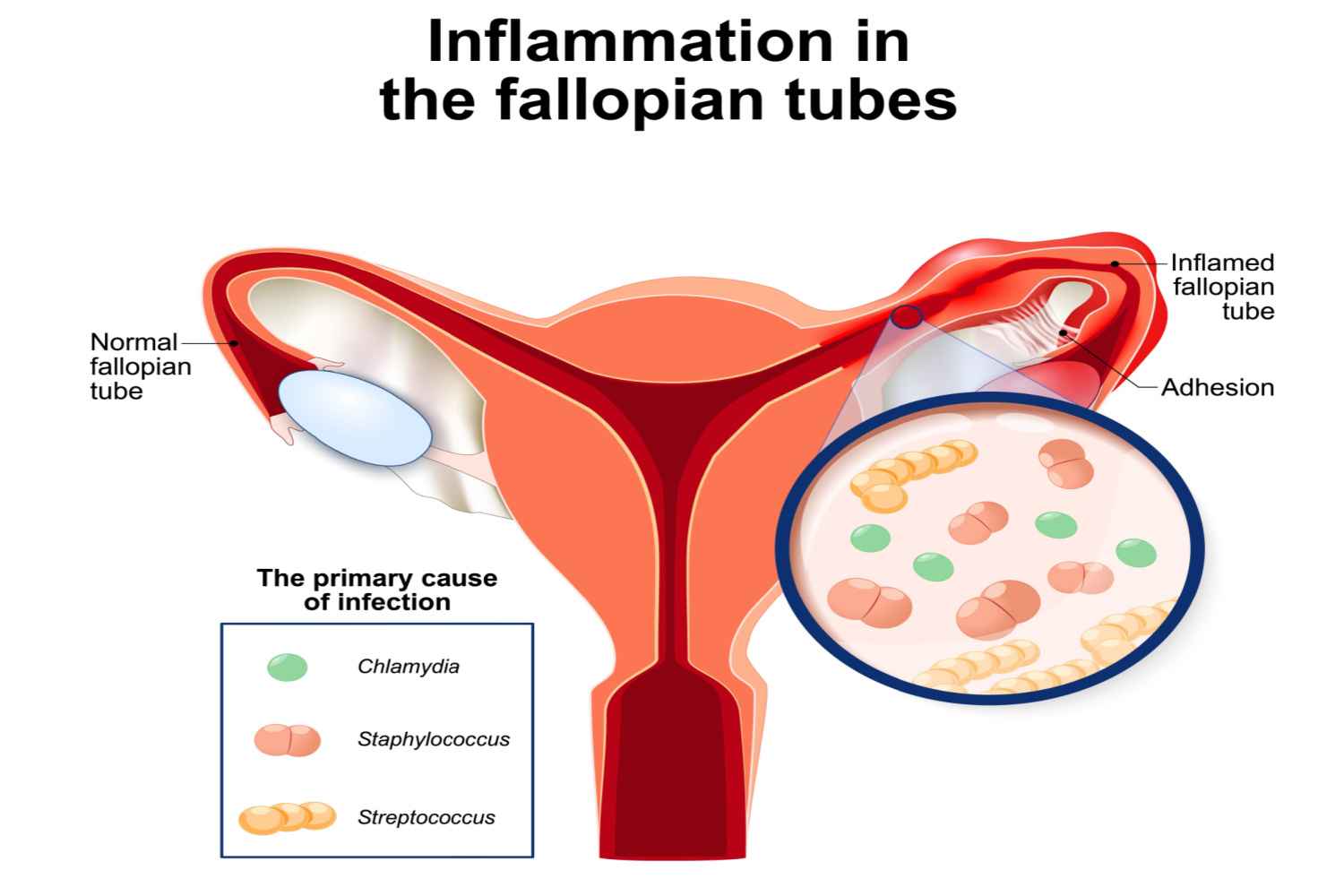
PID is one of the major causes of blocked Fallopian tubes and causes distal blockage. PID refers to the collective inflammatory issues that affect the female reproductive system by creating blockage and damage to the Fallopian tube. The Fallopian tubes twist or the walls may fuse together thus creating a total blockage.
3. Surgeries
Complications due to surgeries that involve the uterus and Fallopian tubes like a C-section, abortion, etc. can cause a blockage.
4. Fibroids
A fibroid (6) may bring about pressure on the Fallopian tubes, thus causing a blockage in the path of sperm or eggs.
5. Ectopic Pregnancy
Sometimes, instead of continuing to travel toward the uterus, the fertilized egg implants in fallopian tubes, resulting in tubal pregnancy. If the woman has already experienced an ectopic pregnancy, she develops an increased risk of scar formation leading to the blockage of the fallopian tubes.
6. Infections
Infections, including sexually transmitted infections (STI) like chlamydia and Gonorrhea or any infection caused by an abortion or miscarriage, can cause a blockage in the tubes.
7. Genital Tuberculosis
Tuberculosis or TB can affect any part of the body. It mostly happens in the lungs (pulmonary tuberculosis). Sometimes the TB infection might pass to other parts of the body through the blood bringing about secondary infections. When the bacteria get as far as the genital tract, it results in genital tuberculosis or pelvic TB. The fallopian tubes get affected (7), causing a tubal obstruction that is irreversible.
8. Ruptured Appendix
If the woman has a history of a ruptured appendix, there is a chance that the infection can affect the fallopian tubes leading to blockage.
How are Blocked Fallopian Tubes Diagnosed?
Some of the common tests used to diagnose blocked Fallopian tubes are
1. Hysterosalpingogram

This is an X-ray test in which a thin tube is inserted through the vagina into the uterus. A dye is passed from this tube, and the uterus is filled with the dye. This is done until the dye spills into the Fallopian tubes. At this point, X-rays are taken to identify any blockage in the tubes.
[Read : Chances Of Getting Pregnant After Hysterosalpingogram (HSG )Test]
2. Chromotubation
This is one of the most reliable tests to determine blockage in the Fallopian tube. This test involves sending a blue color dye into the uterus and Fallopian tubes during the laproscopy procedure. This test gives the doctor better visibility of the dye and possible blockages.
3. Sonohysterography
Sonohysterography is an ultrasound scan that helps diagnose if there are any blockages in the Fallopian tubes
Can I Still Get Pregnant With a Fallopian Tube Blockage?
A blockage in the fallopian tubes makes it difficult to conceive but not necessarily impossible. Women have a pair of Fallopian tubes, i.e., there are two tubes, one for each ovary. If there is a blockage in one of the tubes, you can still get pregnant if the other side is in working order. However, in case of blockages in both fallopian tubes, you may need to consult a fertility specialist for treatment options.
Treatment For Fallopian Tube Blockage
Blocked Fallopian tubes can hamper a woman’s chance of getting pregnant. But, with the advancement in medical technology, many treatment options are available to unblock the fallopian tubes. A surgical procedure is an option for reopening the Fallopian tubes. Depending on the location and how far the blockage is, different types of surgeries are available.
Some of the surgical problems to treat blocked fallopian tubes include
1.Tubal Re-Anastomosis
The blocked or infected segment of the tube is removed, and two healthy ends of the tube are rejoined. This procedure is either done through a laparotomy, which involves a large incision in the lower abdomen, or laparoscopy, in which a small keyhole incision on or near the belly button is done.
2. Salpingectomy
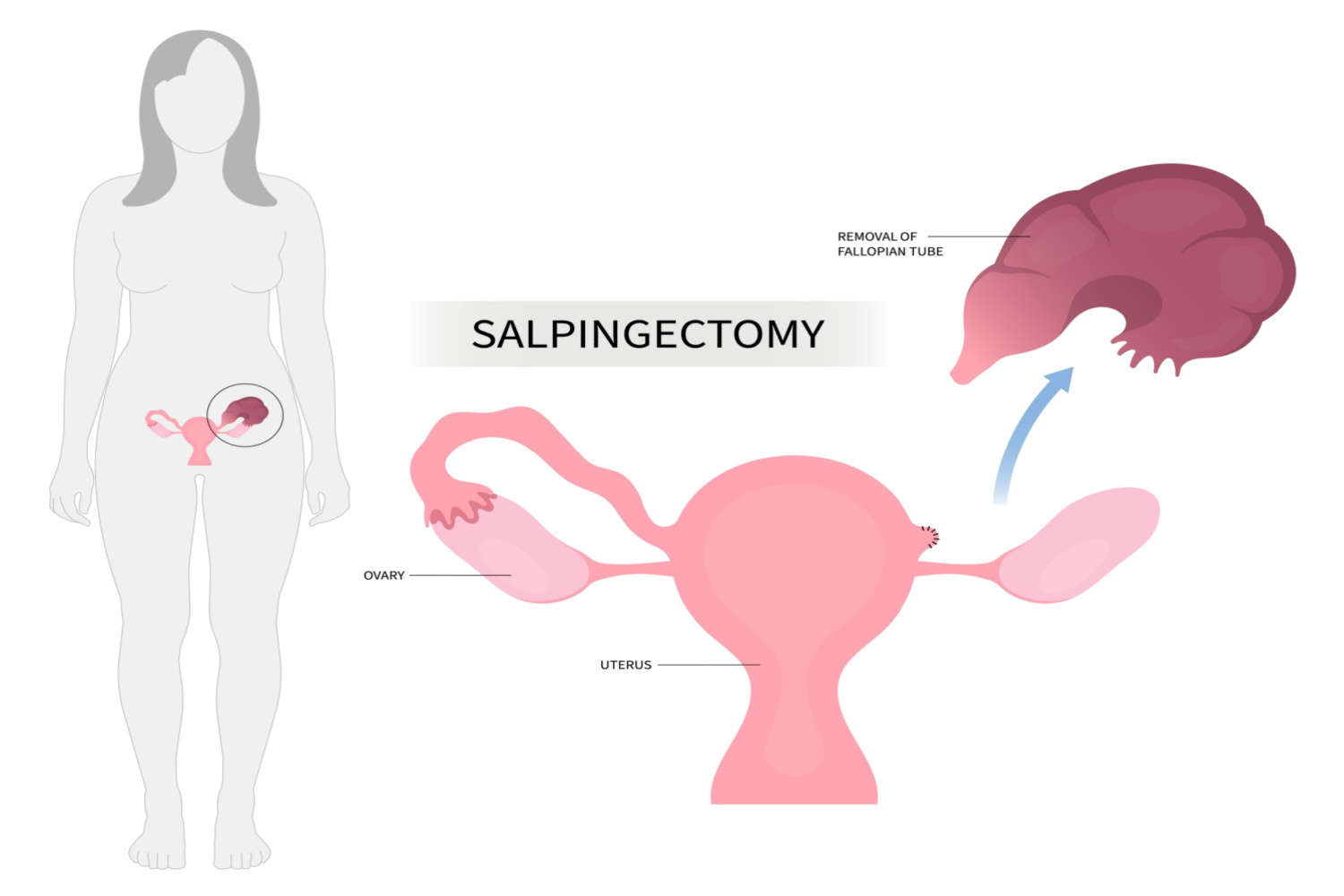
This procedure involves removing a part of the Fallopian tube. It is usually performed in the case of Hydrosalpinx type of blockage. This is usually performed before going for IVF. This is because without treating Hydrosalpinx, the chances of success of IVF is very low.
3. Fimbrioplasty
This is performed when the fimbriae are damaged and stuck together, preventing the released egg from being picked up from the ovary. The purpose of the surgery is to rebuild fimbriae. The drawback is that there are very few experienced and expert specialists in this field.
4. Salpingostomy
This surgical method is suggested when Hydrosalpinx obstructs the end of the Fallopian tube. The surgeon makes another opening near the end of the Fallopian tube that opens to the ovary. The drawback is that the success of this method is often temporary and most probably the scar tissue regrows causing another blockage.
5. Tubal Cannulation
Tubal cannulation is a non-surgical procedure that doesn’t involve any type of incision. A catheter is inserted through the cervix, uterus, and into the Fallopian tube under ultrasound guidance. The doctor will know the exact location of the block, and when the catheter reaches there, the doctor opens up the block by blowing up a balloon in the catheter. Hysterosalpingography is performed prior to this procedure in which the doctor expels a dye through the catheter to identify the exact location of the block.
[Read : Hysterosalpingography]
Complications and Risk Factors of Blocked Fallopian Tubes
Blocked fallopian tubes usually do not present symptoms for most women. However, there are two conditions associated with blocked tubes.
1. Pain in the Belly or Pelvis
Many women with blocked tubes may experience in their pelvis or belly region. This may be on and off as in during your menstrual cycle or permanent pain. This doesn’t require immediate medical attention but may require a visit to the doctor to find out the root cause.
2. Ectopic Pregnancy
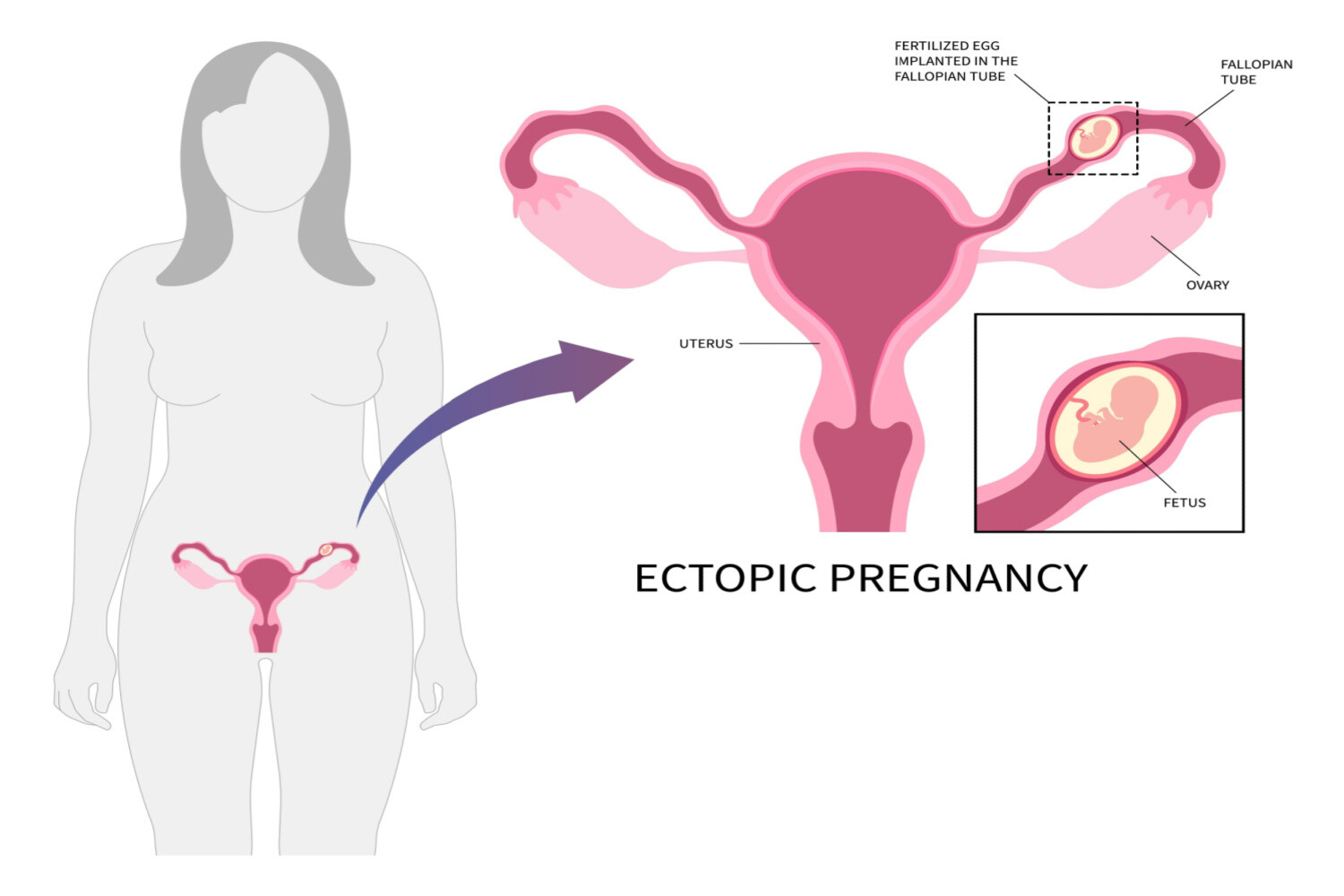
This is a much more serious complication of having blocked fallopian tubes. Sometimes, the fertilized egg may get stuck in the blocked fallopian tube resulting in an ectopic pregnancy (8)which will need a visit to the emergency.
[Read : Ectopic Pregnancy]
When to Consult the Doctor?
If you have tried for pregnancy for over a year and still have been unable to get pregnant, you may need to visit the doctor to get your fallopian tubes checked and plan the next course of action. Ectopic pregnancy is a condition that definitely requires a doctor consultation who will advice how to proceed with planning your next pregnancy.
Blocked fallopian tubes may not be a very serious condition and timely intervention will help you deal with the condition and plan for your pregnancy. Consulting a good gynecologist may be a good idea if you suspect or have blocked fallopian tubes. They will advise you on how to go ahead if you are planning to get pregnant.
FAQ’s
1. How do Doctors Check to See if Fallopian Tubes Are Blocked?
HSG or hysterosalpingogram (9) is the most common test to check for blocked fallopian tubes. This test involves injecting a dye into the uterus and the fallopian tubes and taking X-rays to detect the possible presence of blocks. Other common tests include chromotubation and sonohysterography.
2. Is a Blocked Fallopian Tube Life Threatening??
The condition of blocked fallopian tubes on its own is not life-threatening. However, having blocks in the fallopian tubes can often lead to an ectopic pregnancy and complications related to this type of pregnancy can be life-threatening and need immediate medical attention.
3. Can I Get Pregnant With Blocked Fallopian Tubes?
Yes, pregnancy with blocked fallopian tubes is possible if the block is present only in one of the tubes. But if the block is present on both sides, you may need to get treatment to get pregnant. If you have been trying to get pregnant for more than a year and are still unable to conceive with blocked fallopian tubes, you may need to consult a gynecologist or fertility specialist.
4. What Are the Symptoms of Tubal Blockage?
The most common symptom of a tubal blockage is pain in the pelvis or the abdominal area. The pain may be constant or occasional, for example when you have your periods. Some women may not experience any symptoms and the condition may show during a routine gynecological examination or when you are trying to conceive.
5. Can a Woman With Blocked Fallopian Tubes Get Pregnant?
Yes, a woman with blocked fallopian tubes may be able to get pregnant when only one of the tubes is blocked. Some women may find that they take more time than others to get pregnant since only one of the two tubes is functioning. In case of blockage in both tubes, you may need medical assistance to achieve pregnancy.
6. Do Periods Occur if the Fallopian Tube is Blocked?
Yes, blocked fallopian tubes usually do not interfere with the menstrual cycle and you should be getting your periods normally. But in case you suffer from irregular periods and/or are having difficulty conceiving and you suspect blocked fallopian tubes, you will need to get a doctor’s consultation.
References
- Prevalence of Tubal Obstruction in the Hysterosalpingogram of Women with Primary and Secondary Infertility – [www.ncbi.nlm.nih.gov/pmc/articles/PMC3911818/]
- Fallopian tubes – literature review of anatomy and etiology in female infertility – [www.ncbi.nlm.nih.gov/pmc/articles/PMC4392087/]
- ABC of subfertility: Tubal subfertility – [https://www.ncbi.nlm.nih.gov/pmc/articles/PMC194096/]
- Relationship between Chlamydia Trachomatis Infection with Patency Tubal and Non-Patency Tubal Occurrence in Infertile Women – [https://www.ncbi.nlm.nih.gov/pmc/articles/PMC6980829/]
- Endometriosis and the Fallopian Tubes: Theories of Origin and Clinical Implications – [www.ncbi.nlm.nih.gov/pmc/articles/PMC7355596/]
- The Impact and Management of Fibroids for Fertility: an evidence-based approach – PMC – [https://www.ncbi.nlm.nih.gov/pmc/articles/PMC3608270/]
- Genital tuberculosis in females – PMC – [https://www.ncbi.nlm.nih.gov/pmc/articles/PMC5663156/]
- Current knowledge of the aetiology of human tubal ectopic pregnancy – [https://www.ncbi.nlm.nih.gov/pmc/articles/PMC2880914/]
- Hysterosalpingogram – [https://pubmed.ncbi.nlm.nih.gov/34283512/]
Read Also: Can Ovarian Cysts Make It Difficult To Get Pregnant?
